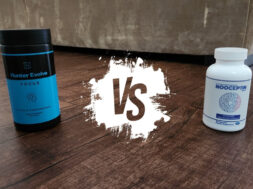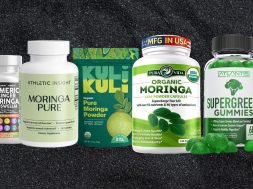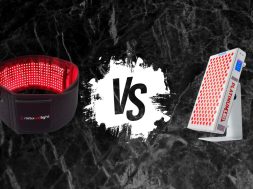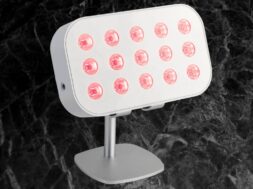
Hunter Focus has emerged as one of the best nootropics on the market due to its extensive formulation and comparatively affordable price tag. But how does it compare to one of my personal favorites, Nooceptin?
This extensive compression will answer all the questions you might have when choosing between these two excellent nootropics supplements.
Hunter Focus is better in every conceivable way. It has one of the most extensive formulations on the market, and most of the dosages match the literature. It is a stimulant nootropic with a comprehensive list of components providing long-term brain health and power benefits.
The only area Alpha Brain is better in is the price. Despite its popularity and marketing, the Onnit product trails behind the better nootropics on the market, such as Hunter Focus, not because the formula is bad but because the ingredients are underdosed.
| Feature | Winner |
|---|---|
| Ingredients | Hunter Focus |
| Dosage | Hunter Focus |
| Short-Term Effects | Hunter Focus |
| Long Term Effects | Hunter Focus |
| Third-Party Testing | Draw |
| Clinical Research | Draw |
| Side Effects | Draw |
| User Reviews | Draw |
| Price | Nooceptin |
Winner
Hunter Focus is clearly superior because it has double the amount of ingredients of Nooceptin, including containing all of its components, and the price is comparable.
But based on my experience with each nootropic supplement, neither Hunter Focus nor Nooceptin hold a light to Mind Lab Pro.
Mind Lab Pro has 3 clinical studies backing it’s formula and is a non-stimulant nootropric to enhance short and long term brain function.
What Is Hunter Focus?

Hunter Evolve, a member of the Roar Ambition family, is a premium supplement brand aimed at the top echelons of the fitness, business, and health industries.
The brand distinguishes itself by providing high-quality, research-backed products aimed at individuals seeking to improve their physical health, cognitive performance, and overall lifestyle without compromise.
Hunter Focus adheres to this corporate policy and is marketed as a premium nootropic using safe, tested ingredients that have been scientifically shown to deliver the cognitive advantage you want.
The customized blend at the heart of this supplement provides the nutrition your brain requires to perform at its best, even under stress.
Hunter Focus has a long list of ingredients, and the Hunter Focus review of the product explains each one in much greater detail.
What Is Nooceptin?

Nooceptin contains high-quality, scientifically supported substances that improve mental clarity, focus, and cognitive power.
Unlike many supplements that overload the body with stimulants, Nooceptin works on a more subtle level to promote brain health. It uses the synergy between its ingredients to provide a long-lasting boost without the crash often associated with caffeine-containing products.
The company producing Nooceptin also makes Vyvamind, which is one of my favorite stimulant nootropics.
Nooceptin is one of the best non-stimulant nootropics. The Nooceptin review explains why I often recommend it.
Hunter Focus vs. Nooceptin Main Differences

Benefits
Nooceptin is a comprehensive non-stimulant nootropic that aims to boost all your cognitive functions. It is specifically designed to help you get more done in less time by making you more focused, motivated, and productive.
The all-natural formula contains many proven brain boosters with the potential to make every day more productive. It gives you the edge you need to perform demanding cognitive tasks under pressure.
Hunter Focus targets men and women in their prime who want to stay on top of their game. The recipe contains 14 active substances as well as a few vitamins, all of which have been scientifically proven efficient.
What distinguishes Hunter Focus from other nootropics is the larger dosages. While all ingredients can be found in other formulations, the dosages are too often lower.
The blend improves memory, mood, focus, and concentration, raises creativity, and increases vitality.
Ingredients
Hunter Focus contains a more comprehensive formulation than Nooceptin, and this is the objective truth. Each of the 7 active ingredients in Nooceptin is also in Hunter Focus, but the product has another 7, for a total of 14, to deliver a broader palette of possible benefits.
The primary distinction between the two (aside from the more extensive ingredients list) is the presence of 100 mg of caffeine in Hunter Focus. The popular stimulant is combined with L-theanine, like in other effective nootropics, because the combination provides consistent increases in energy and mood.
Their combined power can improve working memory, reaction time, visual processing speed, and alertness while decreasing mental and physical fatigue [12,13].
Nooceptin also contains L-theanine, which is still a very effective ingredient on its own. It is used to relieve stress and anxiety and improve verbal fluency and executive function [1] [2].
Bacopa monnieri is a shared ingredient in the two products. According to research, the Ayurvedic herb is beneficial for verbal learning, memory development, and delayed recall [4]. Hunter Focus contains a much higher dose of 300 mg, while Nooceptin has only 150.
The two products contain Citicoline (250 mg in Hunter Focus and 200 mg in Nooceptin), which optimizes brain pathways and boosts neural regeneration, focus, brain energy, and memory [9][10].
Citicoline has been shown to boost brain cell membrane formation by up to 26% and brain energy by 13.6%
Rhodiola Rosea is an herbal adaptogen that strengthens mental and physical stress resistance, boosts mood, and lessens symptoms of anxiety and sadness when taken every day for several weeks [5].
Nooceptin has a higher dose, 150 mg, compared to 50 mg in Hunter Focus.
Another interesting shared ingredient is Lion’s Mane Mushroom. This unique mushroom works well for decreasing stress and increasing working memory, attention, and reaction time [6][7].
Hunter Focus has 500 mg, and Nooceptin 400 mg, while the studies on Lion’s Mane were done with 1000 mg.
Panax Ginseng is another popular substance found in the two supplements. Ginseng is an effective cognitive enhancer in older people with mild cognitive impairment [19]. Nooceptin matches the proven efficacious dose of 200 mg, while Hunter Focus is underdosed with only 40 mg.
The last shared ingredient is Ginko Biloba. Ginko improves blood flow to the brain, which helps to reduce cognitive loss in senior people. It may also be useful in lessening the impact of Alzheimer’s [17,18].
In addition to all the ingredients that are shared, Hunter Focus has more to offer.
Next on the list is Phosphatidylserine. Supplementation with the substance has been shown to increase cognitive function, especially in elderly individuals experiencing cognitive decline.
L-tyrosine is a common nootropic ingredient found in Hunter Focus in a higher-than-usual dose of 500 mg. The amino acid is beneficial in situations when you need to handle multiple tasks simultaneously because it improves mind flexibility [3].
Pine Bark extract is a potent antioxidant suggested to improve focus, short-term memory, and blood flow [8]. The doses once again match at 75 mg.
L-carnitine shows mixed results in cognitive enhancements but has well-documented positive effects on physical exercise, such as better recovery, muscle oxygen supply, stamina, and reduced muscle soreness.
The studies about brain health are inconclusive, but L-carnitine may have some benefits as a nootropic [14,15].
Hunter Focus also includes the traditional herbal remedy Ashwagandha, which is used to treat various problems. A study found that it lowers cortisol and relieves stress. It also reduces anxiety and fatigue [16].
Spanish Sage and Maritime Pine Bark Extract round of the ingredients list of Hunter Focus.
Stimulant vs. Non-Stimulant

Hunter Focus is a stimulant nootropic since it contains caffeine, which is a legal drug that most people are familiar with.
Caffeine, particularly when paired with L-theanine, always provides a near-instant boost in energy, mood, and attention.
Caffeine’s adverse effects are also well documented. They may include anxiety, irregular heartbeat, difficulty sleeping, and irritability.
L-theanine is also quite effective in reducing probable adverse effects, but it will not save your sleep if you consume caffeine too late in the day, so keep that in mind.
Nooceptin is a non-stimulant nootropic that cannot achieve such rapid outcomes in any area. It’s more of a long-term benefit supplement.
Short vs. Long-Term Effects
Non-stimulant nootropics, such as Nooceptin, typically produce effects after the second week of administration, with optimal results attained after 2 or 3 months, depending on the formulation and individual.
Studies have found many ingredients work after several weeks of ingestion. For example, the Lion’s Mane mushroom leads to significant cognitive improvements after 6 to 12 weeks.
Rhodiola Rosea has also been found to work much more effectively after several weeks.
Hunter Focus is both a short- and long-term product. The caffeine provides fast results, while the rest of the extensive formulation provides long-term effects after the substances accumulate in the body.
Clinical Research
Neither Nooceptin nor Hunter Focus have complete formula studies. Nevertheless, they use many well-studied herbs, plants, and amino acids, most of which have well-documented benefits.
Of course, a study on a formula proving its synergistic effects is better, but you can still dive deep into research for all ingredients if you are into this kind of thing. I’ve also cited some relevant studies in the ingredients section.
Side Effects
Nootropics use only natural products like herbs, plants, or amino acids, which makes them generally safe for most people. However, some of the ingredients may cause adverse reactions that a small percentage of people may experience.
This includes headaches, digestive difficulties, loss of appetite, dizziness, and confusion. The symptoms are usually light to mild and go away quickly. My experience with the two supplements has been clean I haven’t experienced any issues.
Hunter Focus also contains caffeine, which carries the same risks for caffeine-sensitive people as every other caffeinated product.
User Reviews
There isn’t much to write about user reviews on either product, simply because neither has decided to have a dedicated user review section on its website. Both are great nootropics, and I believe the user reviews would reinforce this, but unfortunately, there is nothing to read through.
I’ve seen some suspicious items on Amazon carrying the Nooceptin logo, but the label does not match the original product, so I believe these are fake products. As a rule of thumb, stick to the official websites when buying nootropics.
Price
| Product | 1 Bottle | 2 Bottles | 4 Bottles / 3 Bottles |
|---|---|---|---|
| Hunter Focus | $90 / 30 servings ($3.00/ serving) | $180.00 / 60 servings ($3.00/serving) | $270 / 120 servings ($2.25/ serving) |
| Nooceptin | $69.00 / 30 servings ($2.30/ serving) | $138.00 / 60 servings ($2.30/serving) | $197.00 / 90 servings ($2.19/ serving) |
My Experience With Hunter Focus And Mind Lab Pro

Nooceptin is a non-stim nootropic I often recommend. It has a solid formulation, and despite being underdosed in some ingredients, it’s a product that delivers better focus, clarity of mind, and productivity when I use it.
Hunter Focus also delivers what I expected. The first line of advantages is obviously due to caffeine, and taking the dose in the morning is an excellent way to begin the day.
Then, in week two of my test, I observed a modest improvement in my focus. By the conclusion of week four, my concentration ability was noticeably better.
As with nootropics, the benefits are not groundbreaking, but their cumulative influence over time might yield dramatic outcomes.
Should You Choose Hunter Focus Or Mind Lab Pro?
Hunter Focus is objectively the superior nootropic. Hunter Focus has every Nooceptin ingredient, but some are better dosed, and there are a few other powerful nootropic compounds on top.
Additionally, you also get caffeine, which acts as a consistent energy booster.
To have twice as many ingredients, Hunter Focus naturally has to cost more, but the price when buying in bulk is the same, which is a very strong advantage for Hunter Focus.
The other thing worth noting is the number of pills. One serving of Hunter Focus is six capsules, while Nooceptin is three.
This can be considered a benefit on Nooceptin’s side because taking 6 pills (in addition to any other supplements you may take) makes me feel like my 90-year-old grandma, who most likely takes fewer pills than this on a daily basis.
As much as I like Nooceptin, the only scenario in which I can recommend it over Hunter Focus is for people who want a non-stim nootropic and find the 100 mg of caffeine in Hunter Focus too much.
Winner
Runner Up
Hunter Focus
A potent nootropic combining stimulants and an extensive and well-dosed list of popular brain-boosting ingredients.
CHECK CURRENT DEALSReferences
- Hidese, S., Ogawa, S., Ota, M., Ishida, I., Yasukawa, Z., Ozeki, M., & Kunugi, H. (2019). Effects of L-theanine administration on stress-related symptoms and cognitive functions in healthy adults: a randomized controlled trial. Nutrients, 11(10), 2362.
- Williams, J. L., Everett, J. M., D’Cunha, N. M., Sergi, D., Georgousopoulou, E. N., Keegan, R. J., … & Naumovski, N. (2020). The effects of green tea amino acid L-theanine consumption on the ability to manage stress and anxiety levels: A systematic review. Plant foods for human nutrition, 75, 12-23.
- Steenbergen, L., Sellaro, R., Hommel, B., & Colzato, L. S. (2015). Tyrosine promotes cognitive flexibility: evidence from proactive vs. reactive control during task switching performance. Neuropsychologia, 69, 50-55.
- Morgan, A., & Stevens, J. (2010). Does Bacopa monnieri improve memory performance in older persons? Results of a randomized, placebo-controlled, double-blind trial. The journal of alternative and complementary medicine, 16(7), 753-759.
- Cropley, M., Banks, A. P., & Boyle, J. (2015). The effects of Rhodiola rosea L. extract on anxiety, stress, cognition and other mood symptoms. Phytotherapy research, 29(12), 1934-1939.
- Docherty, S., Doughty, F. L., & Smith, E. F. (2023). The Acute and Chronic Effects of Lion’s Mane Mushroom Supplementation on Cognitive Function, Stress and Mood in Young Adults: A Double-Blind, Parallel Groups, Pilot Study. Nutrients, 15(22), 4842.
- La Monica, M. B., Raub, B., Ziegenfuss, E. J., Hartshorn, S., Grdic, J., Gustat, A., … & Ziegenfuss, T. N. (2023). Acute Effects of Naturally Occurring Guayusa Tea and Nordic Lion’s Mane Extracts on Cognitive Performance. Nutrients, 15(24), 5018.
- Schoenlau, F. (2021). The multifactorial contributions of Pycnogenol® for cognitive function improvement. In Nutraceuticals in Brain Health and Beyond (pp. 335-341). Academic Press.
- Nakazaki E, Mah E, Sanoshy K, Citrolo D, Watanabe F. Citicoline and Memory Function in Healthy Older Adults: A Randomized, Double-Blind, Placebo-Controlled Clinical Trial. J Nutr. 2021 Aug 7;151(8):2153-2160. doi: 10.1093/jn/nxab119. PMID: 33978188; PMCID: PMC8349115.
- Jasielski, P.; Pi?del, F.; Piwek, M.; Rocka, A.; Petit, V.; Rejdak, K. Application of Citicoline in Neurological Disorders: A Systematic Review. Nutrients 2020, 12, 3113. https://doi.org/10.3390/nu12103113
- Haskell, C. F., Kennedy, D. O., Milne, A. L., Wesnes, K. A., & Scholey, A. B. (2008). The effects of L-theanine, caffeine and their combination on cognition and mood. Biological psychology, 77(2), 113-122.
- Owen, G. N., Parnell, H., De Bruin, E. A., & Rycroft, J. A. (2008). The combined effects of L-theanine and caffeine on cognitive performance and mood. Nutritional neuroscience, 11(4), 193-198.
- The Efficacy of A Nootropic Supplement on Information Processing in Adults: A Double Blind, Placebo Controlled Study Volume 49- Issue 1. Andrea Utley, Yadira Gonzalez and Carlie Abbott Imboden
- Raut, A. A., Rege, N. N., Tadvi, F. M., Solanki, P. V., Kene, K. R., Shirolkar, S. G., … & Vaidya, A. B. (2012). Exploratory study to evaluate tolerability, safety, and activity of Ashwagandha (Withania somnifera) in healthy volunteers. Journal of Ayurveda and integrative medicine, 3(3), 111.
- Bonilla, D. A., Moreno, Y., Gho, C., Petro, J. L., Odriozola-Martínez, A., & Kreider, R. B. (2021). Effects of Ashwagandha (Withania somnifera) on physical performance: Systematic review and Bayesian meta-analysis. Journal of functional morphology and kinesiology, 6(1), 20.
- Lopresti, A. L., Smith, S. J., Malvi, H., & Kodgule, R. (2019b). An investigation into the stress-relieving and pharmacological actions of an ashwagandha (Withania somnifera) extract. Medicine, 98(37), e17186. https://doi.org/10.1097/md.0000000000017186
- Ihl, R., Tribanek, M., & Bachinskaya, N. (2011). Efficacy and Tolerability of a Once Daily Formulation of Ginkgo biloba Extract EGb 761® in Alzheimer’s Disease and Vascular Dementia: Results from a Randomised Controlled Trial. Pharmacopsychiatry, 45(02), 41–46. https://doi.org/10.1055/s-0031-1291217
- Napryeyenko, O., & Borzenko, I. (2011). Ginkgo biloba Special Extract in Dementia with Neuropsychiatric Features. Arzneimittelforschung, 57(01), 4–11. https://doi.org/10.1055/s-0031-1296579
- Nocerino, E., Amato, M., & Izzo, A. A. (2000). The aphrodisiac and adaptogenic properties of ginseng. Fitoterapia, 71, S1-S5.
Affiliate Disclosure:
The links provided may earn us a small commission at no additional cost to you if you choose to purchase the recommended product. This support allows our research and editorial team to continue providing high-quality recommendations. As a participant in the Amazon Services LLC Associates Program, an affiliate advertising initiative, we are able to earn advertising fees through providing links to products on Amazon.com. Please rest assured that we only recommend high-quality products.












